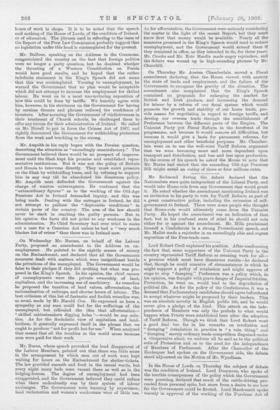Lord Robert Cecil explained his position. After condemning the fact
that some supporters of the Unionist Party in the country represented Tariff Reform as meaning work for all—. a promise which must have disastrous results—he declared that, though he could conceive of circumstances in which he might support a policy of retaliation and might approve of steps to stop " dumping," Preference was a policy which, in his opinion, was fraught with grave danger of Imperial friction. Protection, he went on, would lead to the degradation of political life. As for the policy of the Confederates, it was a demand that Parliamentary candidates should agree beforehand to accept whatever might be proposed by their leaders. This was an absolute novelty in English public life, and he would never give a pledge of the kind. This attack on the inde- pendence of Members was only the prelude to what would happen when Trusts were established here after the adoption of Tariff Reform. Though we think that Lord Robert went a good deal too far in his remarks on retaliation and " dumping " (retaliation in practice is " a vain thing," and " dumping " merely ordinary trade competition disguised under a vituperative alias), we endorse all he said as to the political evils of Protection and as to the need for the independence of Members of Parliament. After the Chancellor of the Exchequer had spoken on the Government side, the debate stood adjourned on the Motion of Mr. Wyndham.










































 Previous page
Previous page